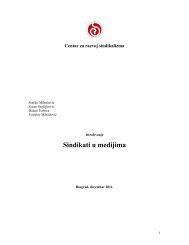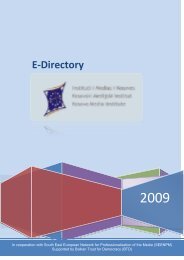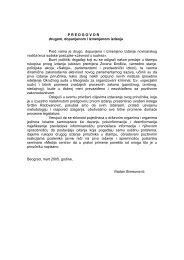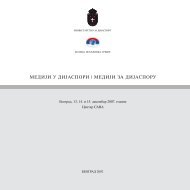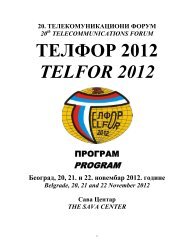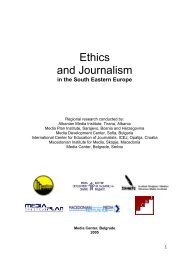- Page 1 and 2:
Media Study Report June 2010 Funded
- Page 3 and 4: 1 Background ......................
- Page 5 and 6: 1 BACKGROUND This study is intended
- Page 7 and 8: By contrast, non-linear Programmes
- Page 9 and 10: Council Directive 93/83/EEC of 27 S
- Page 11 and 12: The Council of Europe dedicates sig
- Page 13 and 14: 2.2 LOCAL ▪ MUNICIPAL ▪ REGIONA
- Page 15 and 16: 2.2.4 STAKEHOLDER BACKGROUND The in
- Page 17 and 18: 2.2.5 COMPARISON WITH EU MEMBER STA
- Page 19 and 20: REGIONAL TV - COMPARISON EU Country
- Page 21 and 22: In cases where commercial media in
- Page 23 and 24: 2.3.1 EU ACQUIS The EU Acquis does
- Page 25 and 26: oadcasters have obviously different
- Page 27 and 28: a draft law 14 . In order to qualif
- Page 29 and 30: TV2 Denmark has by far the largest
- Page 31 and 32: Public service broadcaster with max
- Page 33 and 34: Advertising, sponsoring and product
- Page 35 and 36: The radio and television stations o
- Page 37 and 38: The 2009 EC Progress report says th
- Page 39 and 40: 2.4.5 DENMARK, GERMANY, AUSTRIA 2.4
- Page 41 and 42: Moreover, most OECD countries still
- Page 43 and 44: egulation has prevented the adoptio
- Page 45 and 46: Committee appreciates that digital
- Page 47 and 48: When video recorders were introduce
- Page 49 and 50: In Germany, the re-distribution of
- Page 51 and 52: 2.6 MEDIA CONTENT PROVISION - DISTR
- Page 53: copyright holders, although existin
- Page 57 and 58: Distribution channels The revenues
- Page 59 and 60: 2.6.4 STAKEHOLDER BACKGROUND 2.6.4.
- Page 61 and 62: 2.6.5 GERMANY, AUSTRIA, DENMARK 2.6
- Page 63 and 64: Denmark In Denmark, owners of cable
- Page 65 and 66: The media study has focused on the
- Page 67 and 68: media in other European countries.
- Page 69 and 70: 80 million Dinars (approx. 0.8 mill
- Page 71 and 72: In the year 2009 following the dram
- Page 73 and 74: Germany GDP ca 274 billion EUR71 Ap
- Page 75 and 76: Principles for Collection of Licens
- Page 77 and 78: 3 RECOMMENDATIONS 3.1 RECOMMENDATIO
- Page 79: SWOT Recommendation 1 Strength Edit
- Page 82 and 83: 3.1.3 RECOMMENDATIONS FOR PRINT LOC
- Page 84 and 85: It is hardly sustainable to maintai
- Page 86 and 87: SWOT Recommendation 2 Strength The
- Page 88 and 89: 3.3 RECOMMENDATIONS FOR REGULATORY
- Page 91 and 92: 3.3.3 RECOMMENDATION FOR AN EFFICIE
- Page 93 and 94: Frequencies should be reserved for
- Page 95 and 96: 3.5 RECOMMENDATIONS FOR MEDIA CONTE
- Page 97 and 98: 3.5.2 RECOMMENDATION ON MUST CARRY
- Page 99 and 100: SWOT Recommendation 3 Strength Stak
- Page 101 and 102: 3.6 RECOMMENDATIONS FOR PUBLIC MEDI
- Page 103 and 104: 3.6.2 RECOMMENDATION ON DISTRIBUTIO
- Page 105 and 106:
Recommendation It is recommended to
- Page 107 and 108:
To improve this it is recommended:
- Page 109 and 110:
Serbia is also a country of nationa
- Page 111 and 112:
ecourses should not be used for the
- Page 113 and 114:
5.1 ANNEX - ABBREVIATIONS ANEM Asso
- Page 115 and 116:
5.2 ANNEX - ACQUIS COMMUNAUTAIRE AT
- Page 117 and 118:
Moreover, the Media industry is inv
- Page 119 and 120:
The satellite broadcasting of copyr
- Page 121 and 122:
an audiovisual media service where
- Page 123 and 124:
2.3 The protection of pluralism pri
- Page 125 and 126:
3.2.2 Serbia The principle is addre
- Page 127 and 128:
125
- Page 129 and 130:
4.6 Protection of minors 4.6.1 AVMS
- Page 131 and 132:
There are, nevertheless, some absol
- Page 133 and 134:
Advertising brakes are permitted ev
- Page 135 and 136:
5.2.2 APPENDIX 2 TO ANNEX 5.2 PUBLI
- Page 137 and 138:
more effective control of overcompe
- Page 139 and 140:
There is a substantive body of case
- Page 141 and 142:
In its Recommendation on media plur
- Page 143 and 144:
In 2008, The Committee of Ministers
- Page 145 and 146:
5.4 ANNEX - MARKET REGULATING POLIC
- Page 147 and 148:
5.5 ANNEX - LINKS TO RELEVANT LAWS
- Page 149 and 150:
5.5.3 NATIONAL LAWS Austria KommAus
- Page 151 and 152:
Culture and Media Committee (Nation
- Page 153 and 154:
FONET News Agency TANJUG Press Agen
- Page 155 and 156:
5.8 TV VIEWING TIME IN EUROPE (SOUR
- Page 157 and 158:
5.10 AUDIOVISUAL RECEIVING TECHNOLO
- Page 159 and 160:
5.12 BREAKDOWN OF REVENUES OF PUBLI
- Page 161 and 162:
5.14 TV AUDIENCE SHARE - GERMANY (S
- Page 163 and 164:
5.16 LICENSE FEES IN AUSTRIA 161
- Page 165 and 166:
12) regulate and provide for carryi
- Page 167 and 168:
5.17.2 JURISDICTION OF THE CITY OF
- Page 169 and 170:
4) Service area: area in the vicini
- Page 171 and 172:
permitted practice on part of the b
- Page 173 and 174:
Composition of the Council Article
- Page 175 and 176:
the duties of Council member for a
- Page 177 and 178:
station licence), which is issued b
- Page 179 and 180:
Public Tender Article 49 A broadcas
- Page 181 and 182:
Notwithstanding the provisions of t
- Page 183 and 184:
telecommunications law and regulati
- Page 185 and 186:
Article 73 Of the total annual broa
- Page 187 and 188:
the day the receiver was purchased.
- Page 189 and 190:
Article 89 The Managing Board shall
- Page 191 and 192:
A station set up by a city assembly
- Page 193 and 194:
VII ADVERTISING AND SPONSORSHIP 1.
- Page 195 and 196:
Law comes into effect, shall contin
- Page 197 and 198:
5.19 ANNEX - LAW ON TELECOMMUNICATI
- Page 199 and 200:
28. “interconnection” means a p
- Page 201 and 202:
The Agency shall have the status of
- Page 203 and 204:
egistered associations of businessm
- Page 205 and 206:
technical inspection and other cost
- Page 207 and 208:
the engineering faculties or other
- Page 209 and 210:
company or other entity that is to
- Page 211 and 212:
Article 35 Any legal or physical pe
- Page 213 and 214:
24 3. any requirements for quality
- Page 215 and 216:
2. tariffs shall be set so as to st
- Page 217 and 218:
4. mechanism of compensating public
- Page 219 and 220:
Article 59 The management of the ra
- Page 221 and 222:
tested, measured or reported. The d
- Page 223 and 224:
unloading of passengers or goods an
- Page 225 and 226:
Cooperation between Agency and Broa
- Page 227 and 228:
uilt, manufactured, used and mainta
- Page 229 and 230:
of this Law, including the terms an
- Page 231 and 232:
offence from paragraph 1 of this Ar
- Page 233 and 234:
Article 108 The Agency shall not, f
- Page 235 and 236:
5.20 ANNEX - LAW ON NATIONAL COUNCI
- Page 237 and 238:
4) Decide about the National Counci
- Page 239 and 240:
2) Give opinion on the procedure fo
- Page 241 and 242:
Participation in the institutional
- Page 243 and 244:
The National Council may launch an
- Page 245 and 246:
Article 38 All activities regarding
- Page 247 and 248:
Article 48 The special electoral re
- Page 249 and 250:
2) Make technical preparations for
- Page 251 and 252:
An organisation, association or pol
- Page 253 and 254:
The competent state bodies and the
- Page 255 and 256:
5.21 ANNEX - LOW ON PUBLIC INFORMAT
- Page 257 and 258:
In order to protect the interests o
- Page 259 and 260:
market-oriented information, newspa
- Page 261 and 262:
Article 14v The organisation keepin
- Page 263 and 264:
The public prosecutor may request i
- Page 265 and 266:
Appeal against the First-Degree Cou
- Page 267 and 268:
The imprint must be published integ
- Page 269 and 270:
Article 32 A journalist is not obli
- Page 271 and 272:
Article 39 The person, to whom the
- Page 273 and 274:
Information regarding private facts
- Page 275 and 276:
Protection of the Right to Privacy,
- Page 277 and 278:
If the person the information refer
- Page 279 and 280:
Charges shall be filed with the dis
- Page 281 and 282:
If the reply i.e. correction is com
- Page 283 and 284:
a reply has been submitted to the i
- Page 285 and 286:
The restitution of the former state
- Page 287 and 288:
Article 66 The litigants may file a
- Page 289 and 290:
At the request of the person in par
- Page 291 and 292:
The responsible editor shall not be
- Page 293 and 294:
Exclusion of Liability Article 82 T
- Page 295 and 296:
The court shall pass and publicly p
- Page 297 and 298:
Along with the fine from Paragraph
- Page 299 and 300:
2. the responsible editor demands p
- Page 301 and 302:
With the entry into force of this L
- Page 303 and 304:
If the advertisement refers to opin
- Page 305 and 306:
Within the full hour of the program
- Page 307 and 308:
Setting advertising boards in publi
- Page 309 and 310:
Men and women may not be presented
- Page 311 and 312:
must be stated that the lower price
- Page 313 and 314:
Advertising giving up drinking and
- Page 315 and 316:
on the election programmes and acti
- Page 317 and 318:
as well as chambers of commerce als
- Page 319 and 320:
20) advertises lawyers and lawyers
- Page 321 and 322:
(Article 53); 35) shows untruly the
- Page 323 and 324:
or marks in a manner that creates m
- Page 325 and 326:
5.23 ANNEX - DENMARK - BROADCASTING
- Page 327 and 328:
egulations issued pursuant to Secti
- Page 329 and 330:
(4) Decisions made by DR in matters
- Page 331 and 332:
the proportion of programmes of Eur
- Page 333 and 334:
(4) The minimum amount, calculation
- Page 335 and 336:
to one year after notification of a
- Page 337 and 338:
decoding equipment, the purpose of
- Page 339 and 340:
following provision: 10 (1) This Ac
- Page 341 and 342:
5.24 ANNEX - OVERALL NUMBER OF REGI
- Page 343 and 344:
5.25 ANNEX - PUBLICLY FOUNDED MEDIA
- Page 345 and 346:
RA000140 RADIO BAP 8779384 JAVNO IN
- Page 347 and 348:
TV000090 TV BOR 7147317 JAVNO PREDU
- Page 349 and 350:
5.27 ANNEX - PERIODICITY OF MEDIA (
- Page 351 and 352:
5.28 ANNEX - GEOGRAPHICAL SPREAD OF
- Page 353 and 354:
Newspaper 16 Radio program 2 TV pro
- Page 355 and 356:
Radio program 7 Services of news ag
- Page 357 and 358:
Total per place 1 Total per municip
- Page 359 and 360:
Kikinda Kikinda Newspaper 2 Radio p
- Page 361 and 362:
Newspaper 2 Radio program 2 TV prog
- Page 363 and 364:
Drugo sredstvo javnog informisanja
- Page 365 and 366:
TV program 1 Total per place 2 Tota
- Page 367 and 368:
Total per place 2 Total per municip
- Page 369:
Total per municipality 8 Šid Šid



